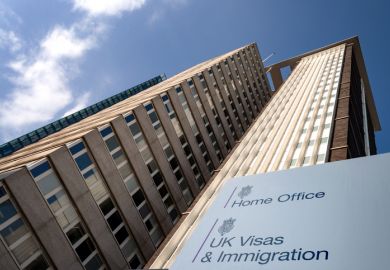The idea of restricting overseas student recruitment to the UK’s “top” universities is said to have come from No 10 rather than the Home Office, and to have brought opposition from the Department for Education, amid suggestions that graduates of institutions judged below standard could lose their post-study work rights.
After The Times reported on 25 November that international students “may be barred from Britain unless they win a place at a top university”, under plans being considered as No 10 seeks to reduce rising net migration, sector sources said there did not appear to be a specific policy proposal circulating in the government. The idea came from No 10 and did not appear to have support from the Home Office or the DfE – with the latter thought to have mounted “strong pushback”.
Other sources suggested that seeking to limit the number of dependants who accompany students on their visas was the most likely outcome, but it was judged to be not impossible that No 10 might seek to close the graduate visa route – which gives students permission to stay in the UK for at least two years after completing a course at a UK university – to graduates of universities deemed to be substandard.
That would deal a lesser blow to the finances of universities affected, compared with removing their ability to recruit from overseas completely, but it would still likely generate strong opposition from sector bodies and the DfE.
The worry is that No 10 appears to be suggesting that the graduate outcomes metrics developed for England by the Office for Students following the government’s drive against “low-value” courses – which set baselines by course and institution on dropout and continuation rates, plus numbers of graduates progressing into professional or managerial jobs – could be deployed to decide which universities would be able to recruit overseas students. That would amount to significant mission creep on the metrics.
At the same time, there is also an understanding that the government is under enormous political pressure on immigration. With quarterly figures set to show further increases in net migration, No 10 is likely to keep returning to the issue of student visas and might start more detailed policy discussions in preparation for future batches of migration statistics.
With the No 10 ideas covered widely by Indian media in particular, there is concern that talk of restricting international student numbers could impact on universities’ recruitment.
International education services firm IDP’s student demand data show that in the week commencing 26 September, the UK was enjoying a 28.27 per cent share of the demand from India across its sites, and as of 27 November this had dropped to 23.55 per cent.
The apparent absence of any firm policy proposal as yet adds to the impression that No 10 is flying some kites to see how the idea of restricting student visas might be received.
“I hope those in No 10 who were doing the kite-flying have been taken aback by the response,” said Nick Hillman, director of the Higher Education Policy Institute, calling the idea “crazy”.
Vivienne Stern, chief executive of Universities UK, said: “We’re all for a stable and well-managed climate for international student recruitment that doesn’t fall back into some sort of boom-and-bust cycle.
“So we’re all for maintaining a really close eye on features of the system that might be vulnerable to abuse. We’ve always been in that space; we talk to the Home Office and UKVI [UK Visas and Immigration] all the time about that. So if there is something they are particularly concerned about, let’s look at that and deal with that.”
Register to continue
Why register?
- Registration is free and only takes a moment
- Once registered, you can read 3 articles a month
- Sign up for our newsletter
Subscribe
Or subscribe for unlimited access to:
- Unlimited access to news, views, insights & reviews
- Digital editions
- Digital access to THE’s university and college rankings analysis
Already registered or a current subscriber?








